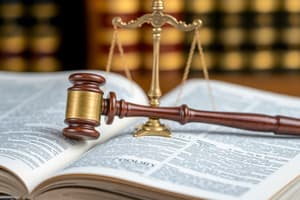Podcast
Questions and Answers
According to Aristotle, what did he say about law and order?
According to Aristotle, what did he say about law and order?
- Law is order, and good law is good order (correct)
- Law is flexible, and good law is flexible
- Law is unnecessary, and good law is unnecessary
- Law is chaos, and good law is chaos
What is the macro function of law related to maintaining peaceful public order in Hong Kong?
What is the macro function of law related to maintaining peaceful public order in Hong Kong?
- Family Status Discrimination Ordinance
- Crimes Ordinance
- Basic Law (correct)
- Disability Discrimination Ordinance
Values are standards of right and wrong learned through socialization.
Values are standards of right and wrong learned through socialization.
True (A)
What are the two major components of a legal system according to the content?
What are the two major components of a legal system according to the content?
Are laws enforced by ______ to prevent one party's actions from infringing on others' rights?
Are laws enforced by ______ to prevent one party's actions from infringing on others' rights?
What ordinance extended the normal retirement ages of judges at the High Court and above, as well as magistrates, by 5 years in Hong Kong?
What ordinance extended the normal retirement ages of judges at the High Court and above, as well as magistrates, by 5 years in Hong Kong?
Which are the principal sources of law in Hong Kong?
Which are the principal sources of law in Hong Kong?
In Hong Kong, common law consists of judge-made law and statute law.
In Hong Kong, common law consists of judge-made law and statute law.
______ deals with the legal relationships and conflicts that arise from them in Hong Kong.
______ deals with the legal relationships and conflicts that arise from them in Hong Kong.
Match the following articles of the Basic Law of HKSAR with their descriptions:
Match the following articles of the Basic Law of HKSAR with their descriptions:
According to the content, what are the three categories of law discussed?
According to the content, what are the three categories of law discussed?
Nurses cannot be held criminally liable for prescribing narcotic drugs if a doctor gives them permission to do so.
Nurses cannot be held criminally liable for prescribing narcotic drugs if a doctor gives them permission to do so.
What is the term for the activity that constitutes the offense in a crime?
What is the term for the activity that constitutes the offense in a crime?
What is the term for the intention to carry out a criminal activity or a high degree of reckless indifference?
What is the term for the intention to carry out a criminal activity or a high degree of reckless indifference?
What is the role of the Labour Tribunal in Hong Kong?
What is the role of the Labour Tribunal in Hong Kong?
What type of claims does the Labour Tribunal in Hong Kong handle?
What type of claims does the Labour Tribunal in Hong Kong handle?
Legal representation is allowed in the Small Claims Tribunal in Hong Kong.
Legal representation is allowed in the Small Claims Tribunal in Hong Kong.
The Small Claims Tribunal in Hong Kong deals with minor monetary claims not exceeding ______. No legal representation is allowed and the hearing is informal.
The Small Claims Tribunal in Hong Kong deals with minor monetary claims not exceeding ______. No legal representation is allowed and the hearing is informal.
Match the following tribunals in Hong Kong with their respective functions:
Match the following tribunals in Hong Kong with their respective functions:
What is equity in the legal system of Hong Kong?
What is equity in the legal system of Hong Kong?
Which legal system is sometimes also referred to as Roman law?
Which legal system is sometimes also referred to as Roman law?
In the adversarial system, the judge is passive and impartial throughout the proceedings.
In the adversarial system, the judge is passive and impartial throughout the proceedings.
The common law system covers most of the English-speaking parts of the world and tends to be more practical and flexible, relying less on ______.
The common law system covers most of the English-speaking parts of the world and tends to be more practical and flexible, relying less on ______.
Match the following legal terms with their definitions:
Match the following legal terms with their definitions:
Why are conditional fee arrangements and contingency fee arrangements banned in Hong Kong?
Why are conditional fee arrangements and contingency fee arrangements banned in Hong Kong?
What is a contingency fee arrangement?
What is a contingency fee arrangement?
Provide one argument in favor of contingency fees.
Provide one argument in favor of contingency fees.
Provide one argument against contingency fees.
Provide one argument against contingency fees.
Flashcards are hidden until you start studying
Study Notes
The Legal System in Hong Kong
- The legal system in Hong Kong consists of a collection of laws, institutions, and personnel.
- It is essential to maintain peaceful public order, political order, social order, economic order, and moral order.
Macro Functions of Law
- Law provides public order, which is essential for maintaining a peaceful society.
- Examples of laws that provide public order include the Basic Law and the Crimes Ordinance.
- Law provides political order, which is usually done by a constitution.
- Law provides social order, which is maintained through contract law and the Sale of Goods Ordinance.
- Law provides economic order, which is necessary for regulating the market in a market economy like Hong Kong.
- Examples of laws that provide economic order include the Companies Ordinance and the Securities and Futures Ordinance.
- Law provides moral order, which is maintained through anti-discrimination laws such as the Disability Discrimination Ordinance and the Family Status Discrimination Ordinance.
Micro Functions of Law
- Law defines the limits of acceptable behavior, such as contract law.
- Law prescribes punishment, such as civil or criminal sanctions for insider trading.
- Law defines the processes for business transactions and other activities, such as contract law and company law.
- Law creates regulatory frameworks, such as the Basic Law, which governs which laws will apply in the Special Administrative Region.
- Law prevents the abuse of official powers, such as the Elections (Corrupt and Illegal Conduct) Ordinance.
What is a Legal System?
- A legal system consists of laws, institutions, and personnel.
- Laws include rules and principles, while institutions refer to the courts and other organizations that apply the law.
- Personnel include judges, lawyers, and other officials who work in the legal system.
Introduction to Ethical and Legal Aspects in Health Care
- The study of ethics and law in health care is essential due to growing concerns about rights to health care, understanding ethical dilemmas, and expanding and extending the roles of nurses.
- Nurses need to study law to avoid malpractice liability.
Laws vs Ethics
- Values refer to the importance or usefulness of something, while morals refer to standards of right and wrong.
- Ethics refer to systems of valued behaviors and beliefs that govern proper conduct and character.
- Laws refer to binding rules of conduct enforced by authority to prevent harm to others.
Ethical Decisions in Nursing Practice
- Ethical decisions in nursing practice involve making choices between two or more equally unfavorable alternatives.
- Ethical dilemmas can be resolved by considering principles such as beneficence, nonmaleficence, autonomy, and fidelity.
The Rule of Law
- The rule of law is the foundation of the common law system.
- The rule of law requires that the power of the government and its servants be derived from law.
- No one, including the Chief Executive, can commit an act that would otherwise constitute a legal wrong.
- The affected person can resort to a court if a legal justification for the action cannot be found.
- The rule of law requires that the courts be independent of the Government.
Judicial Independence
- The rule of law requires that the judiciary be independent of the other branches of government.
- Judges should not be subject to improper influence from the other branches of government or from private or partisan interests.
Sources of Law in Hong Kong
- The principal sources of law in Hong Kong are statute law, common law, and rules of equity.
- Subsidiary legislation, such as proclamations, rules, and regulations, are also sources of law.
- The Basic Law and national laws of the People's Republic of China may also apply in Hong Kong.
Basic Law of HKSAR
- The Basic Law ensures that the legal system in the HKSAR will continue to give effect to the rule of law.
- The Basic Law provides that the laws previously in force in Hong Kong shall be maintained, subject to amendment by the HKSAR legislature.
- The Basic Law ensures that the social and economic systems, as well as the executive, legislative, and judicial systems, shall be based on the provisions of the Law.
- The Basic Law provides for the protection of human rights and freedoms, including the right to equality before the law, the right to confidential legal advice, and the right to social welfare.### Legal System in Hong Kong
- The legal system in Hong Kong is a common law system, with a mix of common law and statute law.
Common Law System
- Judge-made law (common law and equity) is a key component of the legal system.
- Created through the decisions of the superior courts in a court hierarchy.
- Ratio decidendi and obiter dicta are important concepts in common law.
- Doctrine of precedent: stare decisis.
- Decisions of the Privy Council, House of Lords, and other common law jurisdictions can be referred to.
- Role of the Court of Final Appeal (CFA).
Equity
- Equity is an area of law that arises from the English Court of Chancery.
- Developed to address unfairness where no remedy was available through common law.
- Equitable doctrines are based on principles of fairness and justice.
Statute Law
- Enacted in Hong Kong, with some English legislation applying.
- Steps are being taken to "localise" English legislation.
- Subsidiary legislation (e.g., regulations) is made under delegated powers.
Inquisitorial and Adversarial Systems
- Inquisitorial system: the judge intervenes, asks questions, and directs counsel.
- Adversarial system: the judge is passive and impartial throughout the proceedings.
- Inquiry or commission: a special proceeding where a judge acts in an inquisitorial manner.
Common Law Characteristics
- Covers most English-speaking parts of the world.
- Does not rely heavily on written law, tends to be practical and flexible.
- Judge-made law applies to new circumstances.
Statute Law Enacted in Hong Kong
- The vast majority of statute law is made locally.
- Contained in the Laws of Hong Kong.
Coroners Ordinance
- Deals with inquests into deaths.
- Sections 14, 15, 16, and 18 outline the circumstances under which an inquest is required.
Reportable Deaths
- 20 reportable deaths are specified, including sudden deaths, accidents, and deaths in custody.
Chinese Customary Law
- Applies in some aspects of Hong Kong law.
- Recognised in the New Territories Ordinance and the Legitimacy Ordinance.
Categories of Law
- Private law: deals with relationships between individuals (e.g., contract, tort, property).
- Public law: deals with relationships between the government and individuals (e.g., criminal, administrative, constitutional).
- International law: deals with relationships between states.
Criminal Law
- Deals with offenses against society as a whole.
- Requires actus reus and mens rea.
- Sanction of punishment vs. resolution of disputes.
International Co-operation
- Hong Kong judgments can be enforced in many common law jurisdictions and foreign countries.
- Extradition agreements provide for the surrender of persons accused or convicted of serious crimes.
International Law
- An agreement between sovereign states and international organizations.
- Treaties or conventions, e.g., Sino-British Joint Declaration.
- Can affect the development of the common law.
Mainland Judgments in Civil and Commercial Matters
- The Mainland Judgments in Civil and Commercial Matters (Reciprocal Enforcement) Ordinance (Cap. 645) came into operation on 29 January 2024.
- Implements the "Arrangement" signed on 18 January 2019.
- Establishes a more comprehensive mechanism for reciprocal enforcement of judgments.
Legal Institutions
- Legislative institutions: the Legislative Council (art 66 of the Basic Law) and subordinate legislation.
- Judicial institutions: courts, which administer justice.
- Executive institutions: the HKSAR government, including the Department of Justice.### DOJ Comprises 5 Divisions
- The Department of Justice (DOJ) consists of 5 divisions.
Legal Personnel
- Chief Executive
- Secretary for Justice
- Legislative Council Members
- Judges
- Juries
- Barristers and solicitors
- Duty lawyers
- Justices of the Peace
- Academic personnel
The Courts
Court of Final Appeal
- Replaced the Privy Council
- Determines particular appeals with the Chief Justice, three permanent judges, and one non-permanent Hong Kong judge or one judge from another common law jurisdiction
- Develops the law for the community
Court of Appeal
- Hears appeals on all matters, civil and criminal, from the High Court and the District Court, Lands Tribunal
- Makes rulings on questions of law referred by lower courts
- Has 13 other Justices of Appeal
- May appoint one or more Justices of Appeal as vice-presidents
Court of First Instance
- Has unlimited jurisdiction in both criminal and civil matters
- Hears appeals from Magistrates’ Courts, the Small Claims Tribunal, the Obscene Articles Tribunal, the Labour Tribunal, and the Minor Employment Claims Adjudication Board
- Judges sit with a jury of seven (or nine on the special direction of the judge) for criminal trials
- Article 46 of the National Security Law allows the Secretary for Justice to direct a case be tried without a jury
District Court
- Has limited jurisdiction in both civil and criminal matters
- Hears civil disputes of a value over 75,000butnotmorethan75,000 but not more than 75,000butnotmorethan3 million
- Has criminal jurisdiction limited to 7 years’ imprisonment
- Tries criminal cases except murder, manslaughter, and rape
- Appeals against the assessment of stamp duty imposed by the Collector of Stamp Revenue
Magistrates’ Court
- Has limited criminal jurisdiction
- Covers a wide range of indictable and summary offenses of punishment up to a maximum of two years’ imprisonment, or a fine of $100,000
- May impose sentences of up to 3 years’ imprisonment where there are two or more indictable offenses being dealt with at the same time
- Cantonese-speaking special magistrates, not legally qualified, are appointed to deal with cases like hawking and minor traffic offenses
Coroner’s Court
- Inquires all deaths that occur as a result of accident or violence, or whenever a person dies suddenly and the cause of death is unknown, or a body is found within or brought into Hong Kong
Juvenile Court
- Hears charges against children (under 14) or young persons (under 16) for any offense other than homicide
- Children under the age of 10 are deemed not to have reached the age of criminal responsibility
- Has power to deal with care and protection cases involving young people aged up to 18
Lands Tribunal
- Determines the sums payable by the government and others for compensation to persons whose land is compulsorily resumed or the value of which is reduced because of public or private developments
- Determines building management disputes
- Determines appeals from decisions of the Commissioner of Rating and Valuation
- Determines all matters under the Landlord and Tenant (Consolidation) Ordinance
Labour Tribunal
- Settles disputes between employees and employers
- No legal representation is allowed
- Deals with claims arising from the alleged breach of a term of contract of employment, wages in lieu of notice of termination of service, arrears of wages, statutory holiday pay, annual leave pay, sickness allowance, maternity leave pay, bonus, double pay, severance pay, and long service payment
Small Claims Tribunal
- Handles minor monetary claims involving amounts not exceeding $75,000
- Hearing is informal, and no legal representation is allowed
Obscene Articles Tribunal
- Determines whether an article is an obscene or indecent article and where the matter publicly displayed is indecent referred by a court or magistrate
- Classifies articles as Class I (neither obscene nor indecent), Class II (an indecent article), or Class III (an obscene article)
Market Misconduct Tribunal
- Comprises three members and the Chairman is a judge of the Court of the First Instance
- Determines whether market misconduct (which means insider dealing or any of five other specified types of conduct) has taken place, the identity of any person engaged in that market misconduct, and the amount of profit gained (or loss avoided) as a result of the market misconduct
Electoral Affairs Commission
- Responsible for the conduct and supervision of elections and regulating the procedure at an election
- Reviews and makes recommendations on the delineation of Legislative Council and District Council constituency boundaries
- Makes regulations, guidelines, and arrangements for the registration of electors and the conduct of public elections
The Office of The Ombudsman
- Has powers to investigate complaints from aggrieved persons about maladministration by the Government departments/agencies and public bodies listed in Part I of Schedule 1 to the Ombudsman Ordinance
- Investigates complaints against Government departments/agencies for non-compliance with the Code on Access to Information
- Initiates direct investigation, of her volition, into issues of potentially wide public interest and concern
Nurses Registration Ordinance
- Nursing Council of Hong Kong was established on 3 May 1999
- Composition of the Council as stipulated in section 3(2) of the Ordinance
- Correction of the register (NRO s7)
- Section 3(2) The Nursing Council of Hong Kong Council shall consist of—
Qualification for Registration
- Minimum age of 21 years
- Good character
- Completed prescribed training
- Possesses a valid certificate to practise nursing issued by such certifying body as may be recognized by the Council from time to time as constituting sufficient evidence of his competency to practise nursing
- The Council may require any applicant for registration to prove his competency in nursing by examination and, if required, to undergo such further training specified by the Council
Studying That Suits You
Use AI to generate personalized quizzes and flashcards to suit your learning preferences.





